Our History
In the late 1970s, residents in six Appalachian states conducted a land study, researching the ownership of land and minerals in selected counties, and who paid the taxes. When it was released in 1980, the study documented what many people had suspected, that the valuable coal property was owned primarily by out-of-state holding companies, and they paid almost no taxes to the host counties or their schools.
For many people, it was a shock to see that one of the richest regions of the world in terms of natural resources was so poor in terms of services. The study inspired public anger and led to calls to address the issues it raised. People began meeting about the tax laws that exempted coal owners and the property laws that allowed coal companies to strip mine a landowner's surface without permission.
Through the summer and fall of 1981, forty of these folks held a series of meetings that led to the formation of the Kentucky Fair Tax Coalition. They vowed to change the state tax laws, and reverse a recent law exempting coal companies from property tax on their coal holdings. More importantly, they agreed their approach to change would be direct action organizing.
The evolution of KFTC from a group of several dozen concerned Kentuckians into a powerful organization has been deliberate and thoughtful. We have grown thanks to hard work and persistence. We have had enough successes to keep us motivated, enough failures to keep us hungry and humble. Our strength can be found in our adherence to simple principles of membership control, leadership development, democratic decision-making, and direct action.
KFTC Highlights
1981: Researched by residents, the Appalachian Land Ownership Study is released. In response, people from across eastern Kentucky met several times to form a response, including 26 people from 12 counties who met in Hazard on August 17 and officially named and launched the Kentucky Fair Tax Coalition. A Tax Workshop in October helped focus initial work on tax reform measures, with an eye toward involvement in the 1982 General Assembly.
1982: Members work to remove the property tax exemption for unmined minerals and to stop strip mining without landowners' permission under broad form deeds (BFD). Local organizing becomes the focus of KFTC's work; chapters form in Fayette, Floyd, Leslie and Martin counties.
1983: KFTC starts the Citizen Education and Water Monitoring Project. Residents in Harlan and Magoffin counties get new drinking water supplies after organizing around water contamination problems. Seven new county chapters added.
1984: KFTC legislation to end abuses of broad form deeds becomes law. Coal companies are forced to monitor groundwater quality. Three new chapters added.
1985: Members force the state to comply with the broad form deed law. Citizens in several counties win fights to protect water quality or replace polluted water supplies.
1986: Chapters work for control of the citing of hazardous waste incinerators and challenge plans in two counties. Several water protection measures pass the legislature. The "Citizens' Water Handbook" is published and the Kentucky Leadership Project launched.
1987: The Kentucky Supreme Court rules the broad form deed law unconstitutional. KFTC hosts the Citizens Coal Summit and develops adult literacy materials. KFTC changes name to Kentuckians For The Commonwealth.
1988: KFTC members help pass a hazardous waste local control bill. Supreme Court agrees that the tax exemption on unmined minerals is unconstitutional. 82% of Kentucky voters say "YES" to the Broad Form Deed Amendment to protect landowners from strip miners.
1989: Out-of-state garbage is a concern of many local chapters. Louisville members win incinerator fight and work on low-income utility issues.
1990: Incinerator fight won in Lawrence County. KFTC supports citizens protecting land from oil and gas drillers.
1991: Legislation providing for local control of solid waste management is approved. Knox residents get water hookups.
1992: Members block oil company bulldozer threatening landowner. Bills returning more coal severance tax to mining counties and strengthening open meetings/open records laws are passed. Greenup members win landfill fight.
1993: KFTC wins auger mining ruling that extends protections for surface owners. Louisville members help stop relocation of neighborhood for an industrial plant.
1994: KFTC bill to protect landowners from oil and gas drilling becomes law, as does water replacement rights bill and an energy conservation measure. Members push the U.S. Forest Service for better management of national forest land.
1995: Members start addressing broader issues of economic development/justice and the role of money in politics.
1996: Sustainable use of forests becomes a top issue, along with economic justice issues related to changes in welfare programs. KFTC defends victories of past 15 years.
1997: KFTC's first chapters formed in western Kentucky -- Hopkins and Union counties. Forty KFTC leaders complete Strategic Training and Education for Power program. Residents in Wheelwright win a new concrete bridge to replace a dangerous wooden one; Long Fork residents win some important concessions from a coal company. Mega-hog operations are kept out of western Kentucky. A new welfare/economic justice committee makes access to education a top priority.
1998: KFTC-supported legislation to make it easier for welfare recipients to get a degree is passed. Efforts begin to save Black Mountain. Public pressure forces the state to stop issuing illegal reclamation exemptions to coal companies. Members create Mountain Tradition Herb Cooperative. The Kentucky Economic Justice Alliance is formed with KFTC and four other groups. Workfare abuses exposed and ended. Forestry law passes General Assembly.
1999: Noel Avenue residents in Madisonville finally win promise of sidewalks and storm drainage. Youth recreation center opens in Union County. Upper elevations of Black Mountain (state's tallest peak) saved from mining and logging, thanks to great involvement from youth. Sweatshop awareness raised. Governor enacts parts of KFTC's "access to education" proposal not passed by 1998 General Assembly.
2000: Union County members keep out a controversial PCB plant. Public outcry forces TVA to back off plans to auction 40,200 acres of coal underneath the Daniel Boone National Forest. Citizens in Louisville overcome a mayoral veto to win civilian review of police department Pike County citizens win a "lands unsuitable" petition to block mining in the middle of their community.
2001: Legislation approved to set up universal service funds (low-income utility assistance programs). Land around historic Pine Mountain Settlement School declared off-limits to strip mining. KFTC members battle power plants and sludge ponds. A refundable Earned Income Tax Credit becomes KFTC focus campaign for 2002 General Assembly. August marks KFTC's 20th anniversary.
2002: KFTC foundational documents, including a strong commitment to diversity, reaffirmed in organizational redesign process. Clean Water Act provision gutted in response to KFTC mountaintop removal lawsuit but U.S. district court still rules that coal companies must stop burying streams. KFTC and churches sponsor “Prayer on the Mountain” for healing of strip-mined land. Rowan chapter exposes and stalls unneeded and expensive road project. Louisville mayor’s veto of living wage ordinance overridden. KFTC represented at World Social Forum in Brazil. Citizen pressure forces closure of dangerous Harlan County sludge pond. Noel Avenue residents (Madisonville) get sidewalks and storm sewers after 65 years.
2003: Canary Project launched with highly successful Flyover Festival. KFTC members testify despite harassment at hearing on mountaintop removal. KFTC deepens involvement in comprehensive tax reform campaign. U.S. Appeals Court overturns KFTC victory enforcing Clean Water Act. New Louisville police chief announces long-awaited reforms in use-of-force policies. UK president decides no strip mining in Robinson Forest. Illegally fired LexTran workers get their jobs back.
2004: KFTC helped pass net metering legislation to promote use of solar energy. KEJA tax reform proposals offer clear alternative to governor’s “cut and run” proposals. More than two dozen citizens testify in defense of homes, water and health at public hearing on mining regulations. With ally organizations, KFTC joins two federal lawsuits to prevent the destruction of valuable water resources. The Rowan chapter wins limits on logging in Daniel Boone National Forest. More than 2,000 new voters registered by KFTC in Central Kentucky and elsewhere, part of a broader coalition effort at voter education and mobilization. KFTC joins a coalition to restore voting rights for former felons. Work on coal truck safety issues expanded.
2005: Citizen lobbying pushed passage of a law removing individuals and families below the poverty line from the state income tax rolls and stopped the governor from lowering the income tax rate for the wealthiest Kentuckians. KFTC members also help defeat a bill to allow more overloaded trucks on roads across the state. Legislation to stop valley fills introduced for the first time. The first successful Authors Mountaintop Removal Tour takes place with 17 prominent Kentucky authors and photographers, generating lots of media and public attention, and resulting in the publication of Missing Mountains. Mountain Witness Tours give many more people a firsthand view of mountaintop removal coal mining and its consequences for the land, people and economy. Central Kentucky chapter voter education efforts help win a referendum supporting public transportation. KFTC grassroots fundraising and membership recruitment set all-time records. KFTC gets a new logo.
2006: More than 125 citizen lobbyists came out for “I Love Mountains Day” Lobby Day. Coal truck weight enforcement and voting restoration bills gain attention and support. KFTC’s presence in the General Assembly includes 358 citizen lobbying days in Frankfort, 135 first-time lobbyists and more than 40 at-home lobbying events. KFTC launches newly designed and greatly expanded web site.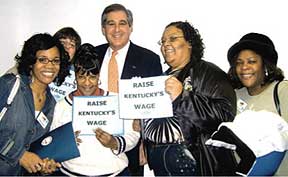 2007: KFTC surpassed goals for Option A, a 3-year plan to increase membership and funding; we ended the year with 5,100 members, more than doubling membership over three years, and raised $214,000 in grassroots fundraising. The Canary Project surged, focusing on economic development and energy alternatives. KFTC worked with allies to win an increase in the state’s minimum wage and mine safety reforms. The Voter Empowerment program was expanded and more former felons became involved in the Restoration of Voting Rights Campaign. Read more in our 2007 annual report.
2007: KFTC surpassed goals for Option A, a 3-year plan to increase membership and funding; we ended the year with 5,100 members, more than doubling membership over three years, and raised $214,000 in grassroots fundraising. The Canary Project surged, focusing on economic development and energy alternatives. KFTC worked with allies to win an increase in the state’s minimum wage and mine safety reforms. The Voter Empowerment program was expanded and more former felons became involved in the Restoration of Voting Rights Campaign. Read more in our 2007 annual report.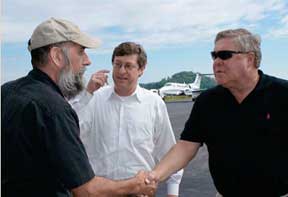 2008: Twelve hundred people attended I Love Mountains Day in at the state capitol. KFTC brought two U.S. congressmen, Ben Chandler (D-Kentucky) and Norm Dicks (D-Washington) to eastern Kentucky to witness the destruction of mountaintop removal. Two new chapters joined: the Bowling Green chapter and the revitalized Floyd County chapter. More than 300 people in support of restoring former felons’ voting rights attended the Rally for Recovery in Frankfort. KFTC hosted its biggest annual meeting ever with more than 150 in attendance, and launched the New Power Initiative at the meeting. A KFTC delegation traveled with the Witness for Peace on a tour of coalfields in Colombia, South America, to exchange stories about how coal mining is affecting their communities. Read more in our 2008 annual report.
2008: Twelve hundred people attended I Love Mountains Day in at the state capitol. KFTC brought two U.S. congressmen, Ben Chandler (D-Kentucky) and Norm Dicks (D-Washington) to eastern Kentucky to witness the destruction of mountaintop removal. Two new chapters joined: the Bowling Green chapter and the revitalized Floyd County chapter. More than 300 people in support of restoring former felons’ voting rights attended the Rally for Recovery in Frankfort. KFTC hosted its biggest annual meeting ever with more than 150 in attendance, and launched the New Power Initiative at the meeting. A KFTC delegation traveled with the Witness for Peace on a tour of coalfields in Colombia, South America, to exchange stories about how coal mining is affecting their communities. Read more in our 2008 annual report.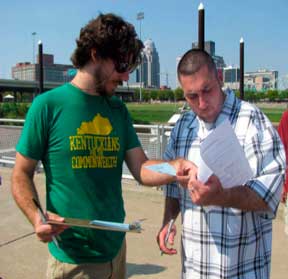 2009: Members traveled to Washington, D.C. for the PowerShift youth conference on climate change and participated in the Capitol Climate Action, the largest mass demonstration on climate change ever. KFTC members joined other residents of areas where coal is mined and supporters in D.C. lobbying to pass the Clean Water Protection Act. Rep. John Yarmuth took a flyover tour of mountaintop removal sites with KFTC. We spearheaded the formation of the KySEA (Kentucky Sustainable Energy Alliance). Three studies were commissioned on alternatives to coal-burning power for Eastern Kentucky Power Cooperative. Members worked for a constitutional amendment to automatically restore voting rights once a felon has completed a sentence, which passed the House with 80 yes votes. The New Power Leaders program was introduced in order to advance leadership development and recruitment. Read more in our 2009 annual report.
2009: Members traveled to Washington, D.C. for the PowerShift youth conference on climate change and participated in the Capitol Climate Action, the largest mass demonstration on climate change ever. KFTC members joined other residents of areas where coal is mined and supporters in D.C. lobbying to pass the Clean Water Protection Act. Rep. John Yarmuth took a flyover tour of mountaintop removal sites with KFTC. We spearheaded the formation of the KySEA (Kentucky Sustainable Energy Alliance). Three studies were commissioned on alternatives to coal-burning power for Eastern Kentucky Power Cooperative. Members worked for a constitutional amendment to automatically restore voting rights once a felon has completed a sentence, which passed the House with 80 yes votes. The New Power Leaders program was introduced in order to advance leadership development and recruitment. Read more in our 2009 annual report.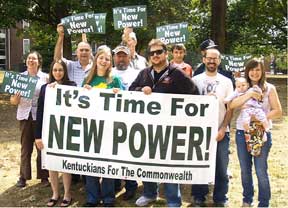 2010: KFTC members met nearly 20 times with federal agencies to push for enforcement of mining and water protection laws. Two new chapters joined: the Scott County chapter and the Northern Kentucky chapter. One hundred and fifty New Power Leaders were recruited and trained. Voter outreach was particularly successful, reaching 150,000 voters and helping Rep. Chandler, who won by less than 700 votes, keep his House seat. Due to pressure from mountain communities, the U.S. Army Corps of Engineers stopped using the Nationwide Permit 21 (a rubber-stamping process) to permit valley fills. Nearly 120 people, including at least a dozen KFTC members, were arrested at the White House during Appalachia Rising. Floyd County members appeared in the film Deep Down, which chronicled their successful efforts to protect their community from strip mining. KFTC and allies helped prevent Eastern Kentucky Power Cooperative from building a new coal-burning power plant in central Kentucky. Read more in our 2010 annual report.
2010: KFTC members met nearly 20 times with federal agencies to push for enforcement of mining and water protection laws. Two new chapters joined: the Scott County chapter and the Northern Kentucky chapter. One hundred and fifty New Power Leaders were recruited and trained. Voter outreach was particularly successful, reaching 150,000 voters and helping Rep. Chandler, who won by less than 700 votes, keep his House seat. Due to pressure from mountain communities, the U.S. Army Corps of Engineers stopped using the Nationwide Permit 21 (a rubber-stamping process) to permit valley fills. Nearly 120 people, including at least a dozen KFTC members, were arrested at the White House during Appalachia Rising. Floyd County members appeared in the film Deep Down, which chronicled their successful efforts to protect their community from strip mining. KFTC and allies helped prevent Eastern Kentucky Power Cooperative from building a new coal-burning power plant in central Kentucky. Read more in our 2010 annual report.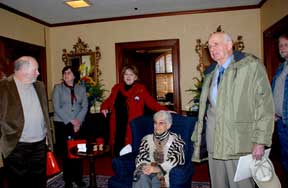 2011: Fourteen KFTC members calling themselves Kentucky Rising held a sleep-in in the state capitol building during the weekend before I Love Mountains Day to protest the governor’s submissiveness to the coal industry. Soon after, Gov. Beshear visited KFTC members in several eastern Kentucky communities. KFTC hosted nine EPA officials on an environmental justice tour of eastern Kentucky. KySEA introduced the Clean Energy Opportunity Act. More than 150 people attended KySEA’s Clean Energy Summit. KFTC launched a new campaign called Kentucky Deserves Better, targeting Kentucky’s Congressional delegation, particularly Hal Rogers. Hundreds attended a KFTC voting rights lobby day and rally in Frankfort. KFTC had its 30th birthday, which was observed by producing a 40-minute video titled I Was There: The First 30 Years of Kentuckians for the Commonwealth. Read more in our 2011 annual report.
2011: Fourteen KFTC members calling themselves Kentucky Rising held a sleep-in in the state capitol building during the weekend before I Love Mountains Day to protest the governor’s submissiveness to the coal industry. Soon after, Gov. Beshear visited KFTC members in several eastern Kentucky communities. KFTC hosted nine EPA officials on an environmental justice tour of eastern Kentucky. KySEA introduced the Clean Energy Opportunity Act. More than 150 people attended KySEA’s Clean Energy Summit. KFTC launched a new campaign called Kentucky Deserves Better, targeting Kentucky’s Congressional delegation, particularly Hal Rogers. Hundreds attended a KFTC voting rights lobby day and rally in Frankfort. KFTC had its 30th birthday, which was observed by producing a 40-minute video titled I Was There: The First 30 Years of Kentuckians for the Commonwealth. Read more in our 2011 annual report.
2012: Read our 2012 Annual Report.
2013: Read our 2013 Annual Report.
2014: Read our 2014 Annual Report.
2015: Read our 2015 Annual Report.
2016: Read our 2016 Annual Report.
2017: Read our 2017 Annual Report.
2018: Read our 2018 Annual Report
Some highlights
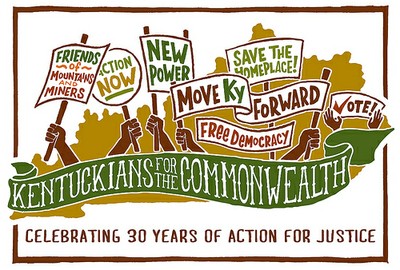
In 2011, KFTC celebrated our 30th anniverary! We had a great birthday party and smaller celebrations throughout the year.
Here are two great products that came from this milestone:
I Was There: The First 30 Years of KFTC is a 40-minute video that documents KFTC's first three decades.
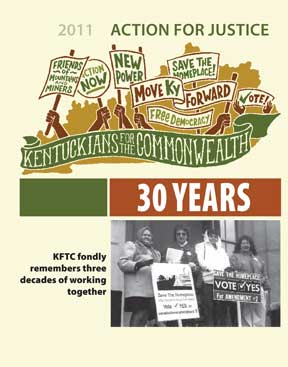 Our 30th Anniversary Booklet also documents our many activities and accomplishments through the years. Download it here (9.7 mb). There are lots of great memories and celebration of our courageous and commited members. Let us know if you'd like a printed copy.
Our 30th Anniversary Booklet also documents our many activities and accomplishments through the years. Download it here (9.7 mb). There are lots of great memories and celebration of our courageous and commited members. Let us know if you'd like a printed copy.
Making History
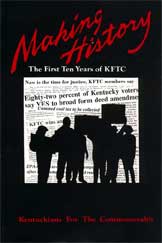 KFTC's first 10 years were documented in Making History: The First Ten Years of KFTC. It's a 192-page hardback account by Melanie Zuercher, published for KFTC's anniversary in 1991.
KFTC's first 10 years were documented in Making History: The First Ten Years of KFTC. It's a 192-page hardback account by Melanie Zuercher, published for KFTC's anniversary in 1991.
A few copies are still available for sale in the KFTC Store, or check with your local library (and ask them to get a copy if they don't have one).
- Home
- |
- Sitemap
- |
- Get Involved
- |
- Privacy Policy
- |
- Press
- |
- About
- |
- Bill Tracker
- |
- Contact
- |
- Links
- |
- RSS

